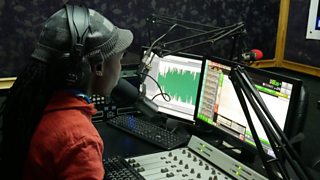Supporting independent radio in Zambia
Vanessa Mweemba
Co-ordinating mentor, Βι¶ΉΤΌΕΔ Media Action Zambia
Tagged with:
In Zambia, sometimes the greatest challenge to independent radio is simply staying on air.
We have a lively media scene here in Zambia, although editorial standards are not always high, and most small community radio stations struggle to make ends meet. Among their many challenges are frequent power cuts which may last for up to eight hours a day – jeopardising programming, audience loyalty, and precious advertising space and revenue.
They also struggle with low salaries and high staff turnover. They often lack insight into who their audiences are and what they need to hear, and don’t have the capacity or knowledge to market their programmes more effectively.
Part of our focus in our Radio Waves project is working with 14 community radio stations, right across the country, to help them overcome these challenges and become more economically sustainable, while bringing higher quality content to their audiences. We work using the editorial standards of the Βι¶ΉΤΌΕΔ to train and mentor journalists to ensure they are delivering impartial, accurate programmes that resonate with their audiences. And we focus particularly on helping them reach younger people, so they can participate in democratic processes, and hold decision-makers to account.
Understanding challenges
We work with them on audience insight and surveys, help them develop effective ways to get feedback for improvement and new ideas, and help with marketing so that they are better able to draw in advertising at a fair price for the market. And we encourage them to consider alternative power sources, learning from those that have turned to solar panels as a more sustainable source of power than generators. Each time, our work and our approach is tailored to that specific context – before we can support them effectively, we need to understand the challenges and who the stakeholders are.

A journalist at Βι¶ΉΤΌΕΔ Media Action radio partner KNC Radio in Kabwe, Zambia.
Now that Zambia is deep in a second wave of COVID-19 infections, our local radio partners face even more complex challenges.
Advertising has dropped even more as small businesses fight to survive and larger ones redirect their spending. And small production teams are trying to continue their programmes while keeping themselves safe, working on rotation and spending more on telephone and Internet when they cannot interview people in person. In one case I know of, a radio station had to pause production when its entire production team tested positive!
But I also know small radio stations are making a difference in their communities. Before joining Βι¶ΉΤΌΕΔ Media Action, I was one of their mentees, at a radio station in the south of the country. So I understand how critical these voices are in providing important information that people need for their day-to-day lives, as well as platforms for debate and discussion.
The power to speak and be heard
What I find most inspiring is seeing communities speaking up about their concerns and holding leaders to account. At one radio station, we were able to inspire a group of young listeners to join a debate broadcast to ask questions of local decision-makers. After this, they realised they could be a part of the solution and formed a youth co-operative, working to improve the community, helping each other with loan applications for starting businesses, and having follow-up meetings with local councillors on issues of concern.
Young people began to realise they have the solutions – they just needed an impartial platform to allow them to challenge cultural norms and ask questions of elders and decision-makers. Radio gave them the voice and the power to speak and be heard.
--
Radio Waves is funded by the Swedish International Development Co-operation Agency (Sida).
Βι¶ΉΤΌΕΔ Media Action’s work in Zambia is providing a foundation for learning in PRIMED - Protecting Independent Media for Effective Development. This Βι¶ΉΤΌΕΔ Media Action-led consortium, funded by the Foreign, Commonwealth and Development Office, aims to support independent media and deliver ground-breaking research and learning on what is most effective in creating sustainable media.
